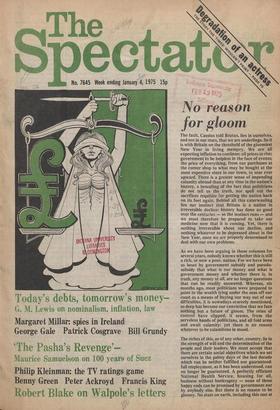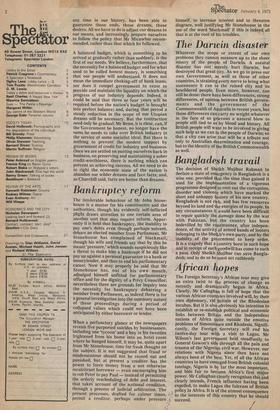No reason
• for gloom The fault, Cassius told Brutus, lies in ourselves, and not in our stars, that we are underlings. So it is with Britain on the threshold of the gloomiest New Year in living mempry. We are all expecting inflation to continue; oil prices to rise; government to be helpless in the face of events; the price of everything, from our purchases at the corner shop to what may be bought at the most expensive store in our town, to soar ever upward. There is a greater sense of impending calamity abroad than at any time in the nation's history, a bewailing of the fact that politicians do not tell us the truth, nor spell out the sacrifices requisite for getting the nation back on its feet again. Behind all this caterwauling lies our instinct that Britain is a nation in irreversible decline: history has done us good over the centuries — so the instinct runs — and we must therefore be prepared to take our medicine now that it is coming. Yet, there is nothing irreversible about our decline, and nothing whatever to be depressed about in the New Year, once we are properly determined to deal with our own problems.
As we have been arguing in these columns for several years, nobody knows whether this is still a rich, or now a poor, nation. For we have been so beset by government subsidy and pseudosubsidy that what is our money and what is government money and whether there is, in truth, any money at all, are no longer questions that can be readily answered. Whereas, six months ago, most politicians were prepared to point to the wealth lying under the seas off our coast as a means of buying our way out of our difficulties, it is nowadays scarcely mentioned, so deep has become our conviction that we face nothing but a future of gloom. The reins of control have slipped, it seems, from the nerveless hands of politicians, and all fold arms and await calamity: yet there is no reason whatever to be calamitous in mood.
The riches of this, as of any other, country, lie in the strength of will and the determination of the people and their leaders. We must accept that there are certain social objectives which we set ourselves in the palmy days of the last decade which can be neither fulfilled nor guaranteed: full employment, as it has been understood, can no longer be guaranteed. A perfectly efficient National Health Service, housing for all, business without bankruptcy — none of these happy ends can be promised by government nor by anybody else. But there is no reason to be gloomy. No state on earth, including this one at any time in our history, has been able to guarantee those ends, those dreams, those desires. All we have to do is adjust our dreams to our means, and increasingly prepare ourselves to follow the policy that Mr Micawber recommended, rather than that which he followed.
A balanced budget, which is something to be arrived at gradually rather than suddenly, is the first of our needs. We believe, furthermore, that the necessity for a balanced budget and for what used to be called honest money, is something that our people will understand. It does not mean the immediate choking-off of bank loans, nor does it compel government to cease to provide and maintain the liquidity on which the progress of our industry depends. Indeed, it could be said that three or four years will be required before the nation's budget is brought into perfect balance; and, during that period a steady reduction in the scope of our Utopian dreams will be necessary. But the contraction need only be gradual: Mr Benn, it is clear, can, if the Government be honest, no longer have the sums he needs to take over British industry in the service of some socialist ideal. But there is nothing to prevent the modest support by government of credit for industry and business. Once we are settled on putting ourselves back in business, on preserving and maintaining a sober credit-worthiness, there is nothing which can prevent us achieving success. All we need to do to right the economic state of the nation is abandon our wilder dreams and face facts; and, as Churchill said, facts are better than dreams.



























